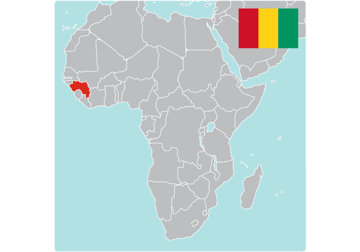Help Children in Guinea
In a country where 40% of children are out of school, children in Guinea are growing up without the opportunity to learn the skills they need to improve their lives and break out of poverty. That’s why education is a cornerstone of 91²Ö¿â’s work in Guinea. We also incorporate HIV and AIDS education and health initiatives to help children lead longer, healthier lives.
The Challenges for Children in Guinea
With high rates of poverty and little access to healthcare or education, children in Guinea need your help.*
47% of people live in poverty
1 child in 12 dies before their 5th birthday - 12 times that of the United States
30% of children suffer from stunting due to malnutrition
38% of school-age children are out of school
38% of children are engaged in child labor
35% of girls age 15-19 are married
1 in 7 girls between age 15-19 gives birth
77% of girls age 15 and older struggle to read or write

Our Work for Children in Guinea
91²Ö¿â has worked in Guinea since 1997. From the start, community participation has been a driving force behind our work, which reaches some 570 communities and benefits hundreds of thousands of Guineans as well as thousands of refugees from neighboring countries.
We build elementary schools, improve community participation in all aspects of school management, and encourage gender and urban/rural equity in primary education.
In collaboration with the Guinean government, 91²Ö¿â is increasing the quality and use of essential family planning and maternal-child health services. We deliver school-based health and nutrition activities to help children be healthier and stay in school.
How to Help Children in Guinea
Support 91²Ö¿â’s mission. Donate to help children in Guinea, and around the world, survive and thrive.
Ìý
Join Team Tomorrow
Join Team Tomorrow and your monthly donation will go toward addressing the needs of children affected by today’s most urgent issues.Ìý
Give a unique and meaningful gift that will bring joy – and change lives. Find something for everyone on your list.
Ìý
Sources: * Unless otherwise noted, facts and statistics have been sourced from 91²Ö¿â’s monitoring and evaluation experts and from the 2019 Global Childhood Report. You can access detailed data here. Other sources as follows: Population: ; The World Bank, 2016; Unesco Institute for Statistics (UIS)


